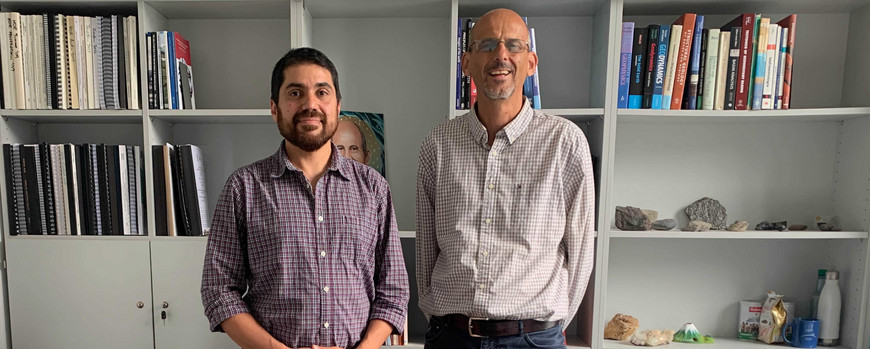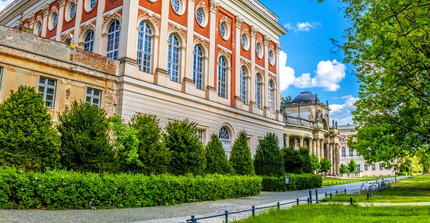Dr. Víctor Hugo García
UP Reconnect Guest: Dr. Víctor Hugo García
Visiting from: Peru
Home Institution: Pontificia Universidad Católica del Perú
Host at the UP: Prof. Dr. Peter van der Beek
Institute at the University of Potsdam: Institute of Geosciences
Time of the visit: October 2023
Dr. Víctor Hugo García did his doctorate in Geological Sciences at the UBA in Argentina in 2010 and since 2023 he is an Assistant Professor at the Pontificia Universidad Católica del Perú. In this interview, he talks for example about challenging aspects of scientific work, his current research interests and how it feels like living and working between two cultures.
Dear Víctor, when was your first stay at the University of Potsdam (UP) and what did you do?
Thank you very much for this opportunity to be interviewed. My first research stay was only 2 weeks in October 2014 in the framework of an international cooperation project on geological hazards led by Prof. Manfred Strecker and Dr. Fernando Hongn (CONICET, Argentina). On that occasion, and with the invaluable help of the then PhD candidate Dr. Heiko Pingel, I had the chance to use the laboratories of the Uni Potsdam to process samples from the Central Andes in order to obtain their ages by the U/Pb geochronological method in zircons.
Prof. Dr. Peter van der Beek is your host here at the UP, how did you two meet?
Prof. van der Beek has been a world-renowned geoscientist for more than two decades, especially for his contributions in the field of thermochronology, a method to which I had the privilege to be thoroughly introduced during an intensive course at Colorado College (USA) in 2007. We met personally at Uni Potsdam in 2018 or 2019 during one of the seminars organized by Prof. Strecker's research group and which I had the honour to coordinate while doing my most recent and longest research stay, between 2017 and 2021.
What specific research collaborations or projects are you involved in during your time here? Can you share any preliminary findings or insights from your work so far?
My recent hiring as Professor of Structural Geology and Tectonics in the Geological Engineering program at the Pontificia Universidad Católica del Perú (PUCP) has led me to look for new regions of study along the Peruvian Central Andes to continue developing my studies on neotectonics and paleoseismology. In that sense, I have focused my attention on the Cordillera Blanca due to the tectonic setting proposed to date to explain its origin, very contrasting with the geotectonic context of that segment of the Central Andes. In discussing this with Prof. van der Beek, he also expressed his interest in studying various aspects of the evolution of the Cordillera Blanca using thermochronology, in particular the 4He/3He system in apatites in his new laboratory set up at Uni Potsdam (https://www.uni-potsdam.de/en/geo/research/general-geology/facilities/3-4-he-thermo-lab). Currently, and after having carried out field work to collect pilot samples, we are in the phase of writing a draft research project that will allow us to expand the knowledge of this region through the integration of multidisciplinary studies.
What were some of the challenges you faced as a researcher and how did you overcome them?
As a Latin American, the main challenges I have had to overcome in order to continue my research career have been mainly related to the economic and socio-political ups and downs of the countries I come from. For example, in 2016 I obtained a researcher position at CONICET, the main organization dedicated to science and technology in Argentina and the best ranked in Latin America, which was my dream since I started my geology studies in 1998. However, the political-economic reality of recent times there has made it impracticable to maintain that position and I have had to look for similar positions abroad, diverting my focus more to economic stability and affecting my scientific productivity. This has also meant having to separate myself, at least for several months of the year, from my family (wife and three children) who continue to reside in Potsdam, considering it the best place for our children to grow up.
What are the advantages for you being in Potsdam for the project?
Academically the advantages are related to the familiarity I already have at the organizational level of both the University of Potsdam and the Institute of Geosciences. On the scientific side, both Prof. van der Beek and his collaborating group assure me a rich interaction with experts in the field that will surely be reflected in high quality scientific productions. Personally, it is a way to be with my family on a regular basis and to seek the long-awaited balance between work and life.
During your academic career, you lived and worked in Argentina, Brazil, Peru and Germany. How does working in these countries differ and how has living in different countries shaped you?
Each country has its own particularities, but Latin American countries have clear cultural and social similarities that distinguish them from Europeans in general and Germany in particular. Doing basic science in South American countries involves constantly facing difficulties and uncertainties of an economic and socio-political nature, which although clearly problematic in general terms also implies the development of soft skills such as resilience at the individual level and empathy and solidarity at the social level. On the other hand, living and working in Germany provides an apprenticeship in customs and values, such as punctuality, sincerity and efficiency, which are rare in Latin American societies. Overall, I believe that both cultures have a lot to learn from each other.
"I believe that research aimed at helping to solve real-world problems should be a priority."
What is your favourite thing about doing research in the field of Geoscience?
My interest in geology arose the day I got to know the Andes during my adolescence, since then I wanted to understand how mountains are formed and the way associated landscapes evolve. Therefore, for me geology is synonymous with mountains, which I consider my main object of study.
How do you envision the potential applications or implications of your research for addressing real-world geoscience challenges or environmental issues in the future?
Although I consider all scientific research to be important, I believe that research aimed at helping to solve real-world problems should be a priority. In this sense, my research interests are closely related to geological hazards, particularly those derived from seismic hazards. To study and know in detail the quaternary tectonic evolution and paleoseismological activity of potentially seismogenic structures is of vital importance to improve seismic hazard estimates in densely populated areas and/or near critical infrastructure.
What have been the highlights or memorable experiences of your time at the UP so far?
Academically, one of the highlights occurred at the beginning of my last postdoctoral stay. Shortly after my arrival and thanks to the support of my host Prof. Strecker, I was able to participate in the 8th International INQUA Meeting on Paleoseismology, Active Tectonics and Archeoseismology held in Blenheim (New Zealand). In that event, I was able to present the advances of my projects on the neotectonics of northwestern Argentina and to interact with numerous colleagues working on similar topics all over the planet. Getting to know a bit of New Zealand geology during the pre- and post-congress trips has been a dream come true.
On a more personal note, a memorable moment experienced during my years in Potsdam has undoubtedly been the birth of our youngest daughter, Elena, in 2017. Going through that experience, in itself transformative in any circumstance, shortly after settling in the city and speaking almost no German, was challenging and exciting at the same time. Fortunately, everything went smoothly, thanks also to the help of the Welcome Center staff who also guided us in other matters related to the process of adapting to life in Germany.
What advice would you give to other international researchers who are considering a short-term visit to the UP?
According to my experience, a short visit of 2 weeks to 1 month is enough both to get to know the University and to have an idea of what life is like in and around Potsdam. In my case, my 2014 visit was very important to define my intention to apply for funding to be able to do a longer postdoctoral stay together with my family. An important point to keep in mind for short visits is the time of the year during which it will take place, it is not the same winter than summer, I would recommend to do it during spring or autumn since those times are a good measure of what daily life is like during the whole year. In any case, a research stay at the Uni Potsdam is very worthwhile, both for the excellent level of the researchers and staff working there and for the possibility of getting to know one of the German cities with the highest quality of life.
Thank you for the interesting interview and we wish you all the best for the future!


